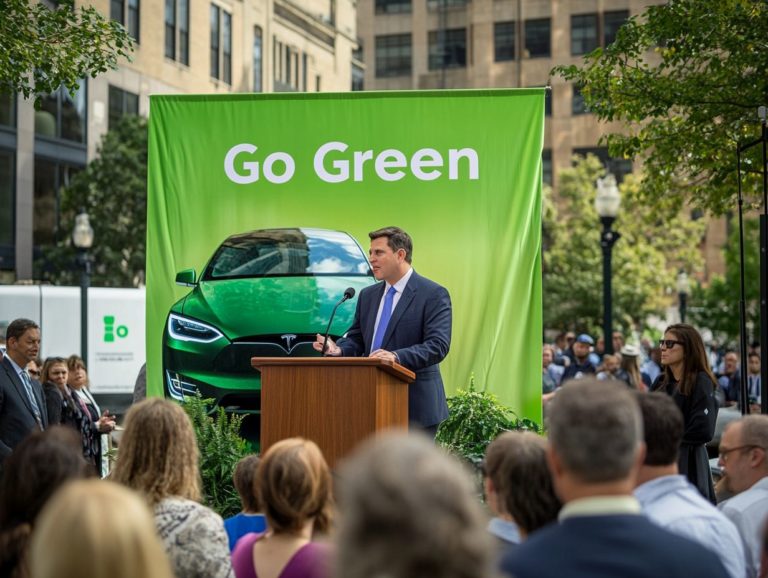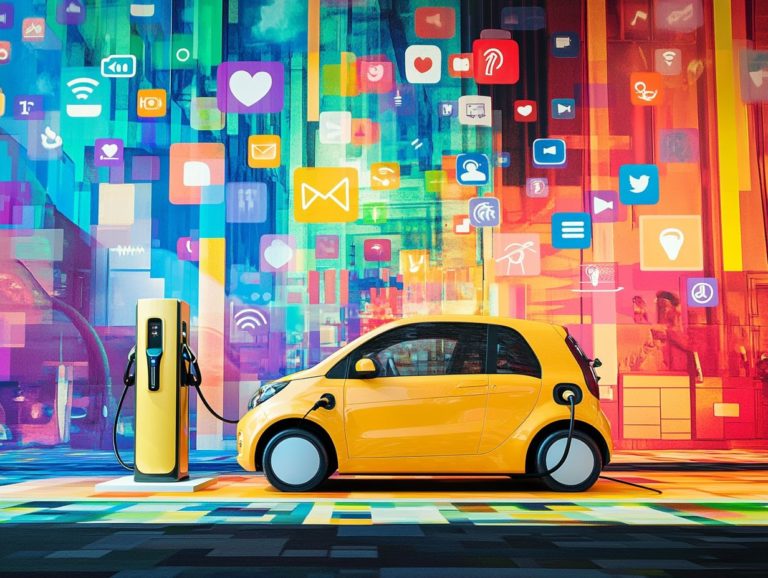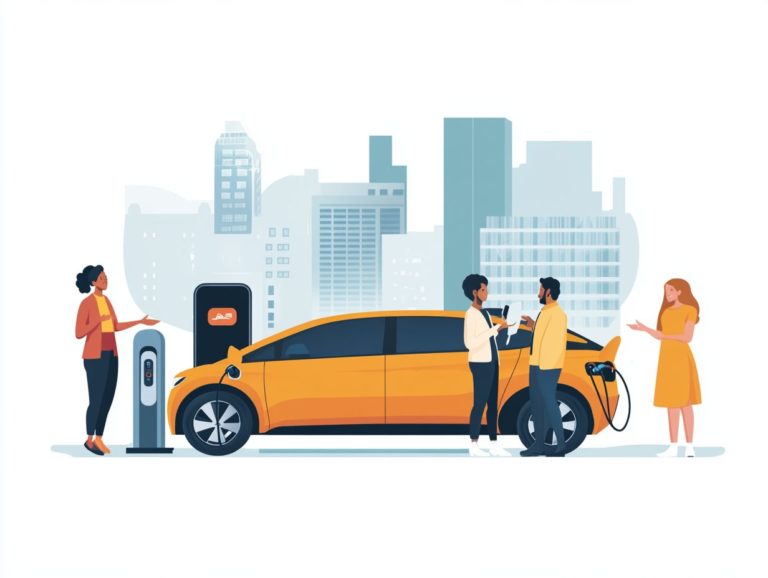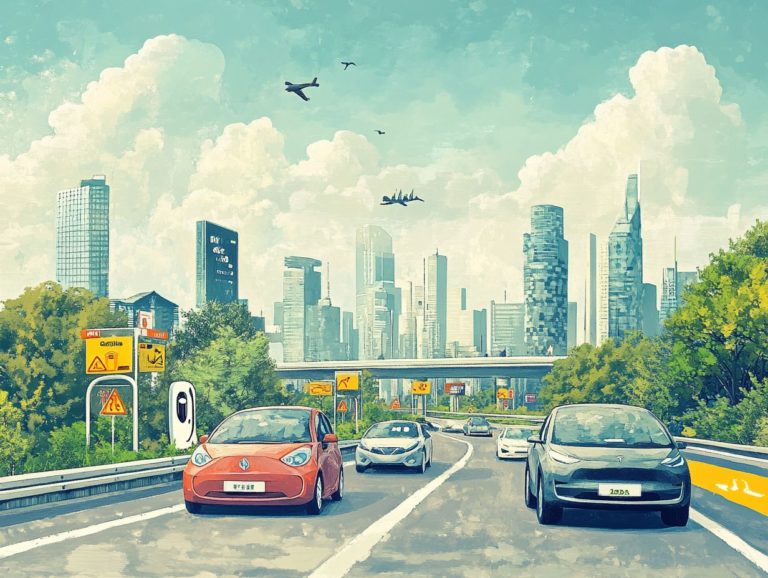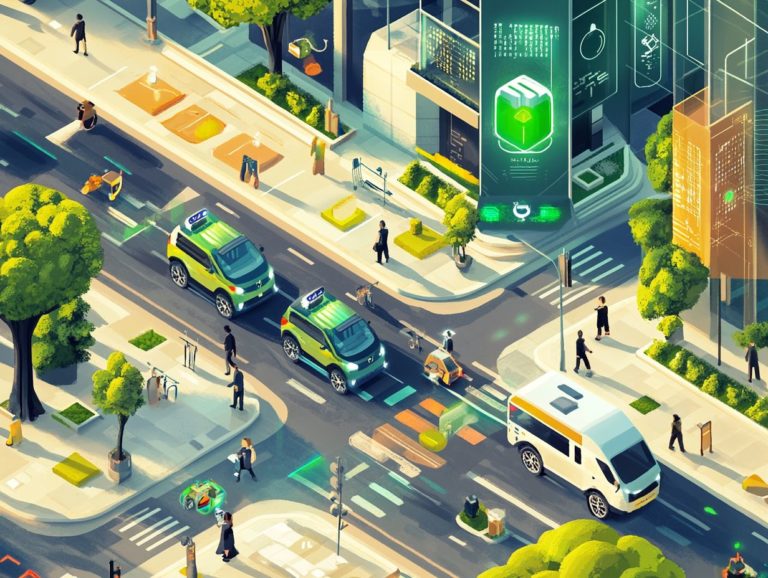Emerging Trends in Electric Vehicle Technology
Electric vehicles (EVs) have truly transformed since their beginnings, progressing through numerous stages of innovation and gaining acceptance in society.
As you delve into the fascinating history of electric vehicles, you ll discover their early developments along with the environmental and economic advantages they present, not to mention the current market landscape.
Thanks to advancements in battery technology and charging stations, the future of EVs appears bright, although there are still challenges to navigate.
This article will take you on a journey through the evolution of electric vehicles, emphasizing their potential impact and the support systems designed to nurture their growth.
Contents
- Key Takeaways:
- History of Electric Vehicles
- Benefits of Electric Vehicles
- Current State of Electric Vehicles
- Technological Advancements in Electric Vehicles
- The Future of Electric Vehicles
- Challenges and Limitations
- Government Initiatives and Incentives
- Frequently Asked Questions
- What are the latest game-changers in electric vehicle tech?
- How are longer range batteries improving electric vehicles?
- What impact does the increased use of autonomous technology have on electric vehicles?
- What is the significance of developing wireless charging capabilities for electric vehicles?
- How is the development of electric vehicle infrastructure contributing to the growth of this technology?
- What are some potential future trends in electric vehicle technology?
Key Takeaways:
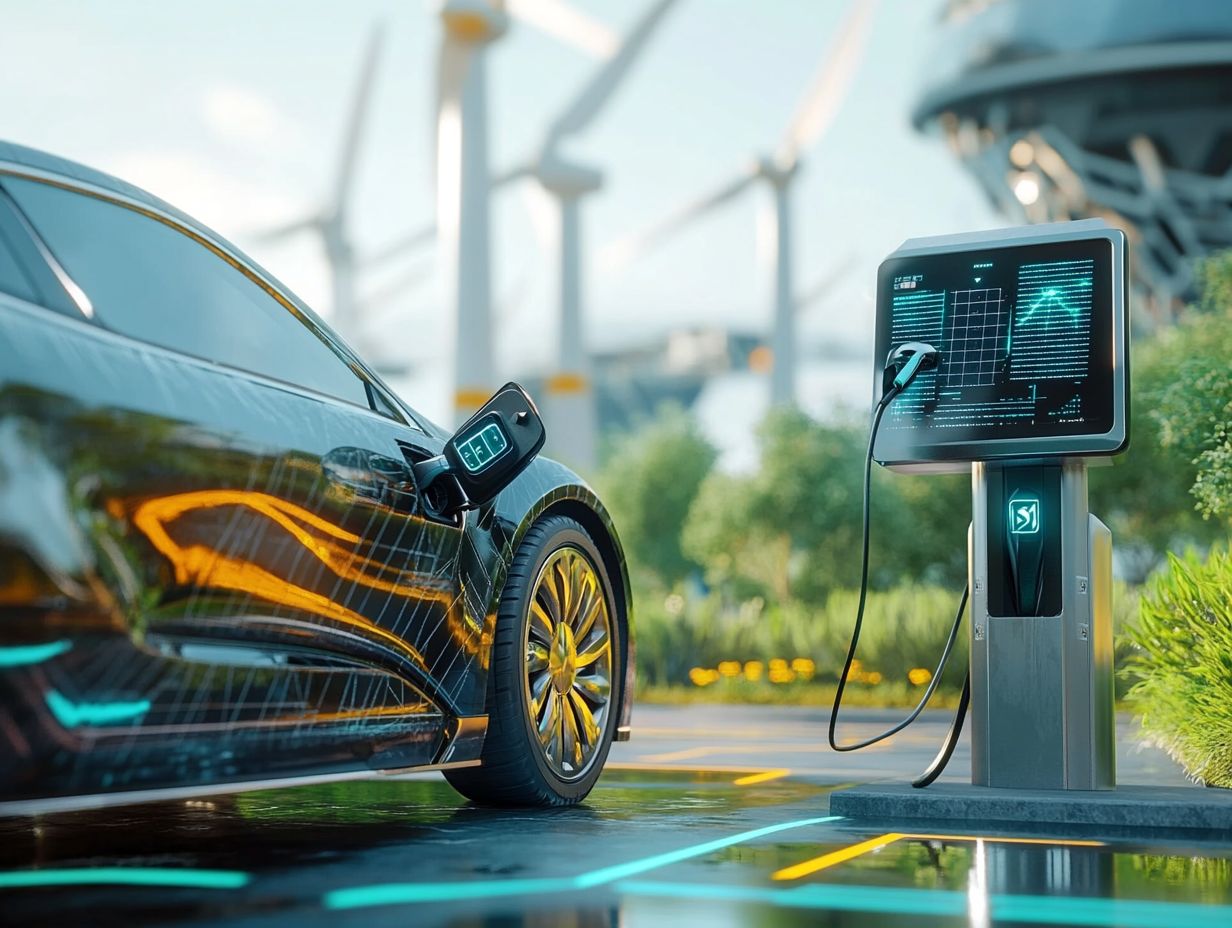
- Electric vehicles offer numerous benefits, including environmental and economic advantages, making them a viable alternative to traditional gasoline vehicles.
- Technological advancements, such as improvements in battery technology and the development of charging stations, are paving the way for the continued growth and evolution of electric vehicles.
- While there are still challenges and limitations to widespread adoption, government initiatives and incentives are helping to drive the market for electric vehicles forward.
History of Electric Vehicles
The journey of electric vehicles (EVs) began in the 19th century with pioneers experimenting with electric drive trains.
Momentum really built in the 21st century, especially with trailblazers like Tesla and BYD.
This shift sparked a major movement in the automotive industry toward green mobility. As emissions regulations grew stricter, the demand for cleaner alternatives fueled advancements in charging stations and battery technology, paving the way for a more sustainable future.
Early Developments and Evolution
The early developments of electric vehicles can be traced back to the late 1800s, a time when inventors like Thomas Parker created the first practical electric vehicle. This laid the groundwork for a century of innovation, paving the way for the impressive modern offerings you see today from companies like Tesla and BYD.
Your journey into the world of electric vehicles begins with battery-powered prototypes that emerged in the early 20th century, showcasing their potential alongside steam and gasoline engines. Various models, including those from Baker and Detroit Electric, captivated public interest for a time.
However, it was the advancements in battery technology and electric motor efficiency during the latter half of the 20th century that truly reignited the fascination.
Fast forward to the 21st century, and you can’t ignore the impact of Tesla’s Roadster, launched in 2008, alongside BYD’s aggressive market entry. These developments have significantly shaped the electric vehicle landscape, underscoring a pivotal shift towards sustainable transportation. They also illustrate how historical milestones continue to inform the design and functionality of the electric vehicles you encounter today.
Benefits of Electric Vehicles
Electric vehicles (EVs) offer exciting benefits that you won t want to miss!
They not only contribute significantly to environmental sustainability by reducing emissions but also offer considerable economic advantages, such as lower operating costs.
This positions them as a key player in the automotive industry’s thrilling shift to green mobility!
Environmental and Economic Advantages
The environmental benefits of electric vehicles are remarkable.
They significantly reduce emissions, improving air quality and lowering greenhouse gas levels.
Economically, electric vehicles offer lower fuel and maintenance costs, making them an enticing option for consumers.
The transition to electric vehicles often comes with tax credits and rebates that lower the initial purchase price. Choosing an eco-friendly vehicle not only benefits the environment but also makes sound financial sense.
As more people embrace these zero-emission alternatives, the collective impact can lead to a notable reduction in urban air pollution, ultimately enhancing public health.
The lower operational costs also incentivize consumers to allocate resources elsewhere, fostering economic growth and sustainability.
These factors make a strong case for adopting electric vehicles. They re not just eco-friendly; they also save you money.
Current State of Electric Vehicles
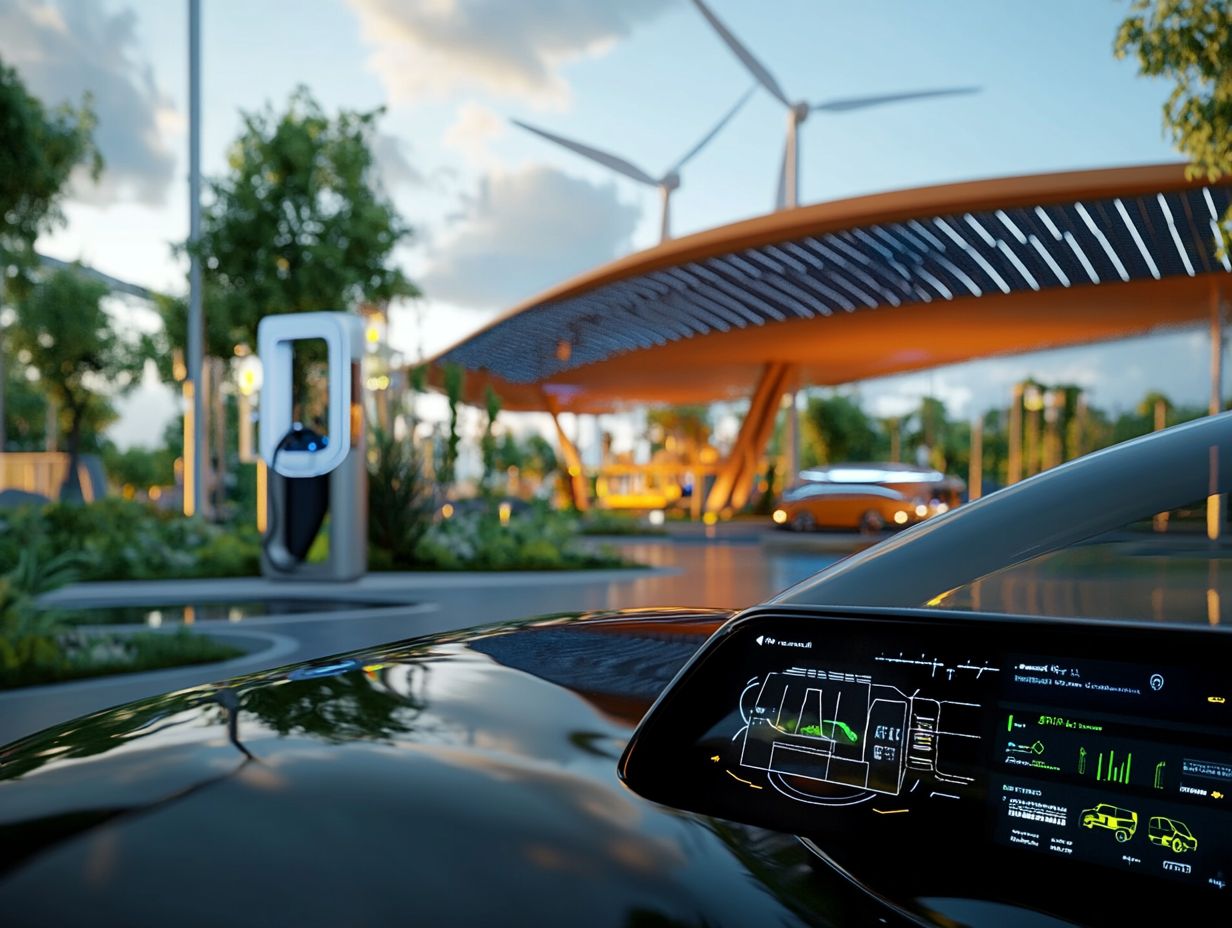
The current landscape of electric vehicles (EVs) presents a dynamic environment marked by strong market trends and remarkable sales growth, driven in part by the latest advances in EV battery technology.
In regions like China, the United States, and Europe, leading manufacturers such as Tesla and BYD are spearheading this transformative wave in the automotive industry, reshaping the future of transportation.
Market Trends and Growth
Recent market trends reveal a substantial surge in electric vehicle sales, driven by the desire for sustainable alternatives and latest innovations in EV technology and remarkable advancements in battery technology.
This growing interest isn’t just reflected in skyrocketing sales figures; it s also a testament to the shift in consumer preferences toward greener modes of transportation.
Factors such as enhanced charging infrastructure and enticing government incentives further elevate the allure of electric vehicles.
Technological innovations, including extended battery life and quicker charging times, address past concerns about range anxiety, positioning electric cars as a more practical choice for daily life.
Forecasts suggest that electric vehicle sales are set to increase by over 35% annually, paving the way for a more sustainable future while aligning perfectly with economic trends that favor environmentally friendly products.
Technological Advancements in Electric Vehicles
Exciting technological advancements are revolutionizing the automotive world, making electric vehicles more appealing than ever! To learn more about these innovations, check out what to expect from EV technology advances.
Innovations in battery technology, such as solid-state batteries and improvements in charging infrastructure, are pivotal in elevating the performance, efficiency, and overall user experience of today s electric vehicles.
This shift is redefining how we drive and think about transportation as a whole.
Improvements in Battery Technology
Recent advancements in battery technology, particularly the emergence of solid-state batteries, hold great promise for significantly boosting the efficiency and performance of electric vehicles.
This development addresses age-old concerns surrounding range and charging times.
These innovations delve into the materials used and cutting-edge manufacturing processes that lower costs and enhance energy density.
Take lithium-ion batteries, for instance; they continue to be the go-to choice due to their extensive use and ongoing improvements in anodes and cathodes, which enhance charge capacity and lifespan.
On the other hand, solid-state batteries could revolutionize energy storage in vehicles, offering higher energy density and improved safety features.
This potential shift could lead to lighter designs and extended journeys between charges.
As these technologies develop and find their way into electric vehicles, you can look forward to greater convenience and a substantial reduction in carbon footprints, making sustainable transport a practical reality. To explore what’s ahead, check out the future of EV technology.
Development of Charging Infrastructure
Charging infrastructure is crucial for adopting electric vehicles. It meets your need for convenient and accessible charging options.
This necessity not only enhances your overall experience but also shapes your view of electric vehicles as a viable alternative to traditional gasoline-powered cars. Public investments and private sector initiatives are vital for building robust charging networks, encouraging you to embrace EVs more readily.
As municipalities and businesses collaborate to establish charging stations in urban and rural areas, the dream of seamless travel for EV owners is becoming increasingly attainable. These advancements are vital for easing your worries about running out of power on the road and ultimately support a more sustainable future.
The Future of Electric Vehicles
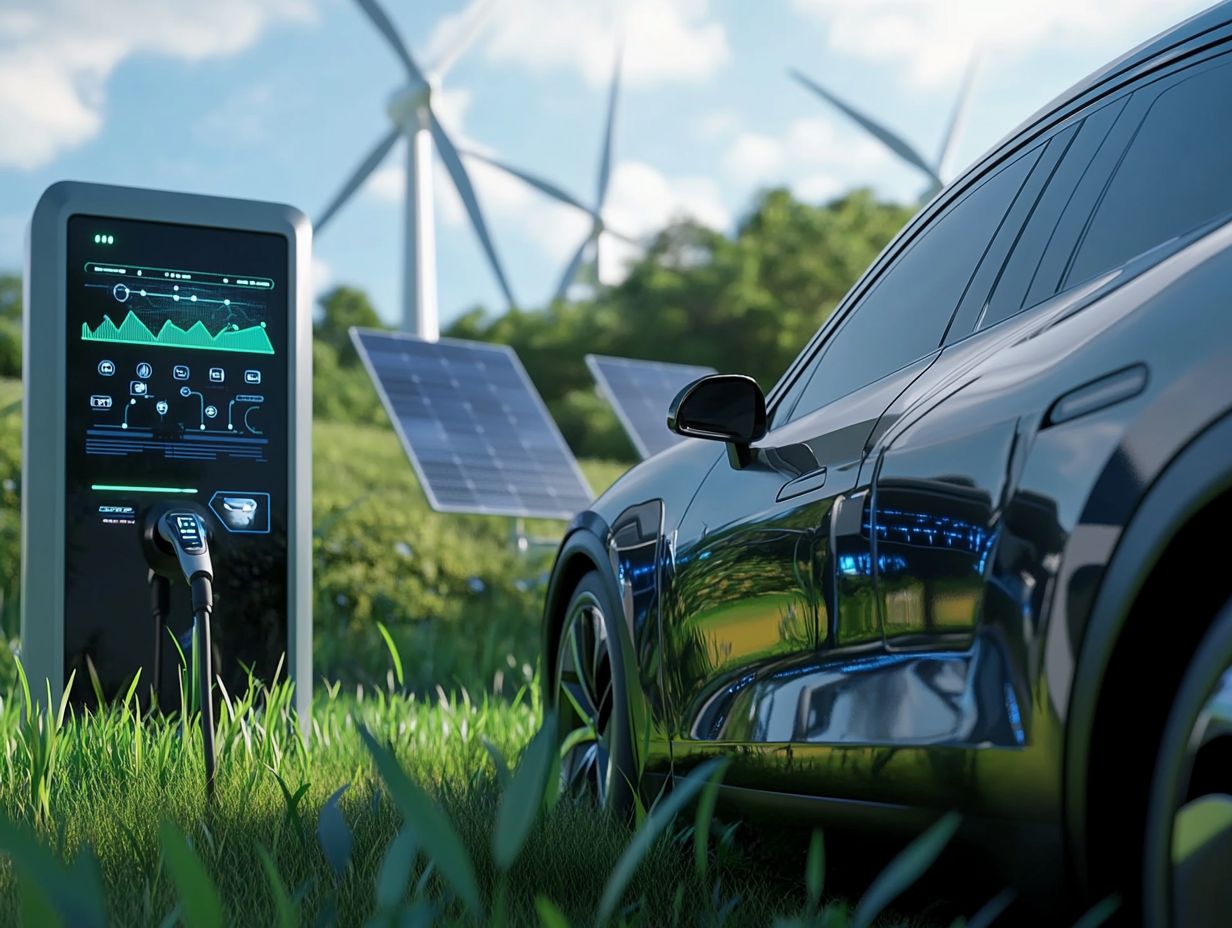
The future of electric vehicles is transforming now, and you can be part of it! Insights point toward a shift in focus toward plug-in hybrid electric vehicles (PHEVs), which combine a gas engine with an electric motor, and fully battery electric vehicles. These innovative technologies making EVs greener are set to play a pivotal role in driving global emissions reductions, shaping a more sustainable tomorrow.
Predictions and Potential Impact
Predictions for electric vehicles indicate remarkable market growth, with a strong focus on reducing emissions and embracing top electric vehicle innovations of 2024 as more sustainable transportation solutions.
As major manufacturers ramp up production and invest in innovative technologies, you can expect the automotive landscape to undergo significant transformation. Analysts indicate that by 2030, electric vehicles may represent a considerable share of total vehicle sales, reshaping your preferences and nudging you toward adopting eco-friendly practices.
This transition promises not only a reduction in greenhouse gas emissions but also revitalizes industry standards, compelling automakers to prioritize efficiency and sustainability in their designs. Ultimately, this shift in consumer behavior underscores a collective movement towards greener alternatives, reflecting a broader societal commitment to environmental stewardship.
Challenges and Limitations
Despite the swift progress in electric vehicles, several challenges remain. These include inadequate infrastructure rollout and fluctuating consumer demands, which continue to impede the widespread adoption of electric vehicles in the automotive industry.
Obstacles to Widespread Adoption
Obstacles to the widespread adoption of electric vehicles include inadequate charging infrastructure, high initial costs, and diverse consumer perceptions that complicate market penetration. Financial factors, such as limited government incentives and the relatively steep price of battery technology, may deter you from making the switch.
Psychological barriers significantly influence your decision-making; many potential buyers harbor doubts about the reliability and longevity of electric vehicle batteries, while concerns about range anxiety linger due to the perceived scarcity of charging stations. Infrastructural issues, particularly in rural areas, create significant gaps in accessibility, making it challenging for residents to view electric vehicles as a practical choice.
Together, these hurdles contribute to a stagnant market as automakers work diligently to address these concerns and cultivate broader acceptance among consumers like you.
Government Initiatives and Incentives
Government initiatives and incentives are pivotal in promoting electric vehicles. They feature a range of carefully crafted policies and programs aimed at encouraging adoption.
These measures not only support individuals in making the switch but also facilitate the automotive industry’s transition to sustainable transportation solutions.
Policies and Programs Supporting Electric Vehicles
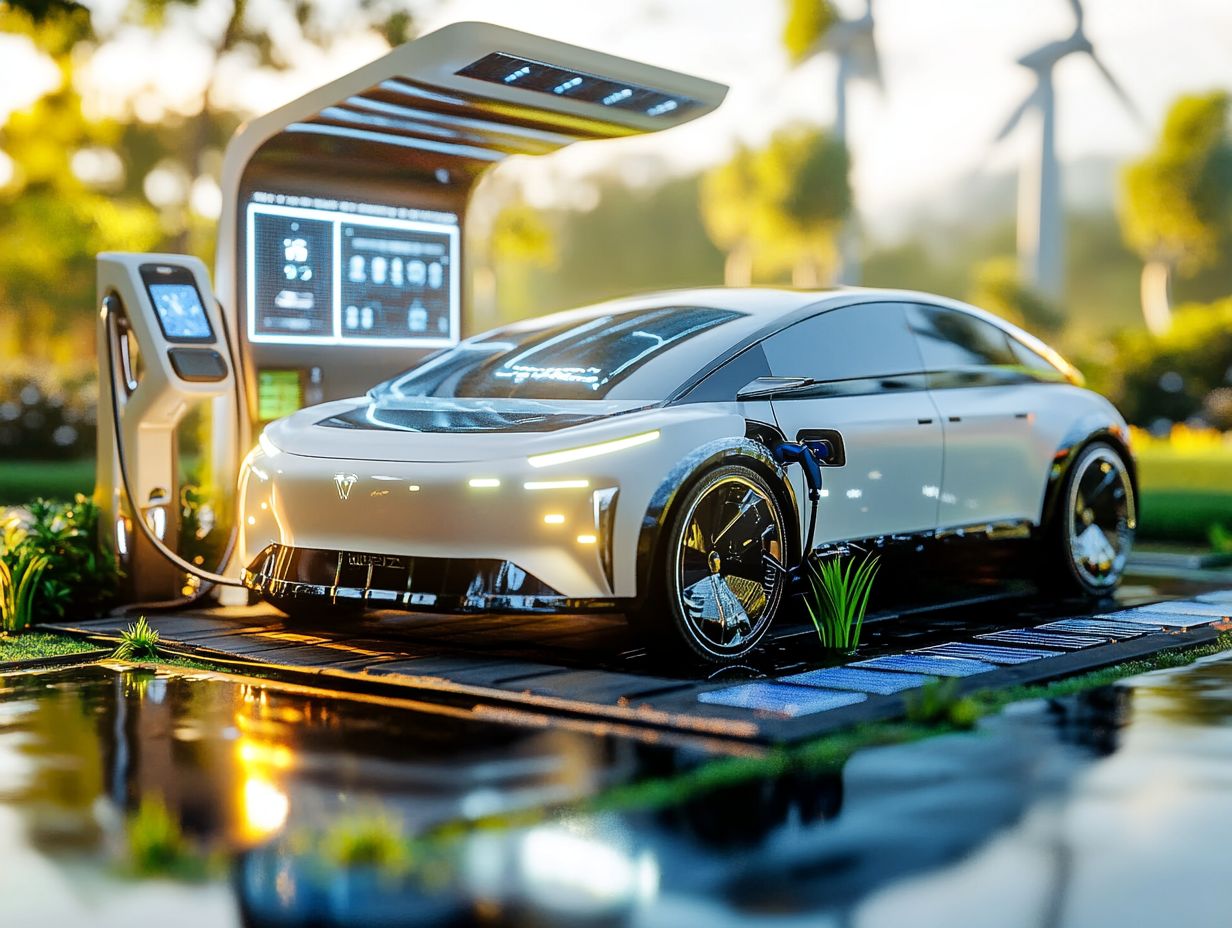
Numerous policies and programs have emerged globally to support electric vehicles, offering financial incentives for consumers. They also invest in charging infrastructure and implement regulations aimed at reducing emissions.
These initiatives are crafted to accelerate your transition to cleaner transportation alternatives. Ultimately, they aim to reduce our dependence on oil. Countries like Norway and Germany are making electric vehicle ownership exciting with generous tax breaks and rebates. This significantly lowers your purchase costs and encourages broader consumer adoption.
The establishment of widespread charging stations enhances your convenience. This effectively addresses the range anxiety or fear of running out of battery power before reaching a charging station that you or potential buyers might feel. Regulations, such as stricter emissions standards, push manufacturers to innovate, leading to a more competitive electric vehicle market.
Collectively, these supportive measures make a significant impact, contributing to remarkable sales growth and enhanced market penetration across various regions.
Frequently Asked Questions
What are the latest game-changers in electric vehicle tech?
Some of the current emerging trends in electric vehicle technology include longer range batteries, increased use of autonomous technology, and future trends in electric vehicles such as the development of wireless charging capabilities.
How are longer range batteries improving electric vehicles?
Longer range batteries allow electric vehicles to travel further on a single charge. This reduces the need for frequent charging and makes them more practical for everyday use.
What impact does the increased use of autonomous technology have on electric vehicles?
The increased use of autonomous technology in electric vehicles is expected to improve safety and efficiency. It also makes them more convenient for drivers.
What is the significance of developing wireless charging capabilities for electric vehicles?
Wireless charging eliminates the need for physical cables and makes charging more convenient for drivers. This technology uses electromagnetic fields to transfer energy between two objects, potentially increasing the adoption of electric vehicles.
How is the development of electric vehicle infrastructure contributing to the growth of this technology?
The installation of electric vehicle charging stations and other infrastructure is making it easier for drivers to own and operate electric vehicles. This further encourages their adoption.
What are some potential future trends in electric vehicle technology?
Faster charging times and improved battery technology are likely future trends in electric vehicles. Additionally, understanding how EV technology is evolving could reveal increased use of renewable energy sources for charging, as well as advancements in self-driving technology and integration with smart cities that could be on the horizon.
Ready to join the electric revolution? Discover more about your options today!

